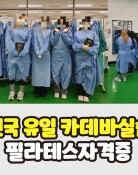Japan unusually speeds up research on iPS cells
Japan unusually speeds up research on iPS cells
Posted February. 15, 2013 06:15,
A hospital in Kobe, Japan, has started the worlds first clinical trial using induced pluripotent stem cells, or iPS, 6.5 years after 2012 Nobel Prize winner Shinya Yamanaka, M.D., Ph.D., created the first iPS cells from animal skin in August 2006.
With Japan trying to pioneer regenerative medicine, the trial could open a new chapter in the treatment of incurable diseases such as cancer and neurological disorders.
The Ethics Committee of Kobe City Medical Center General Hospital on Wednesday approved the plan for the clinical trial on regenerative medicine using iPS cells filed by a research team led by Masayo Takahashi of the Institute of Physical Research and Chemical Research, or RIKEN, under the Education, Culture, Sports, Science and Technology Ministry.
The hospital will seek approval from the Health, Labor, and Welfare Ministry with RIKEN next month. As the Japanese government plans to invest around 110 billion yen (1.18 billion U.S. dollars) over a decade for regenerative medicine using iPS cells as a new growth engine, the clinical trial is likely to get the green light this year.
The plan is to use iPS to treat age-related macular degeneration, or AMD, which causes visual impairment. Vision can be restored by transplanting iPS created from a patients skin cell to the retina.
The research team selected eyes as the subject of its first clinical trial because eye cells or tissues are less likely to develop cancer, and even if a tumor arises, it can be easily removed with a laser.
Japans clinical research on iPS cells is developing unusually fast given that a decade is generally needed in going from basic research to a clinical trial in medicine. Tokyo will use the cells from the clinical trial starting from eyes to blood, the nervous system, kidneys and lungs.
Korean researchers have welcomed the approval of the first iPS cells clinical trial because they had expected a tough road despite a Nobel Prize being award to iPS cells research last year.
The approval of the clinical trial means safety was proven in the stage where organs made of iPS cells are applied to lab animals, said Park Se-pil, a bioengineering professor at Jeju University. If the clinical trial is successful, there will be many studies using iPS in the treatment of various diseases.
Oh Il-hwan, a medical professor at Catholic University of Korea, said, The primary goal of the trial is confirming that iPS cells-made organs can be stable in the human body beyond the effects of the treatment. We need to pay attention to the results of the research.
bae2150@donga.com







